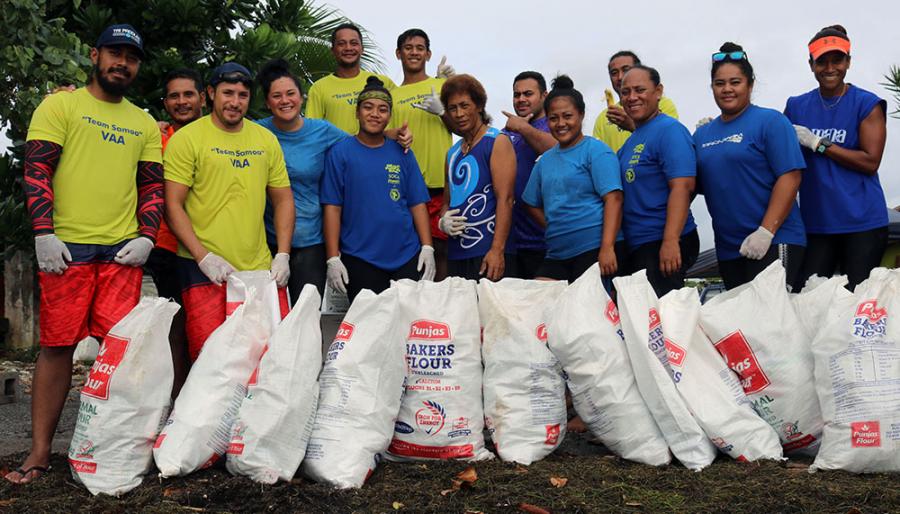
SPREP is leading the charge to make the Pacific Games in July go plastic free in an awareness and outreach initiative aptly called Greening of the Games.
For the first time in its history, the Pacific Games will ban all plastic bags and utensils from all games venues, transport services and accommodation in efforts to influence the behaviour and attitudes of Pacific people to do more to protect the environment.
Activities coordinated by SPREP leading up to Greening of the Pacific Games were launched with a clean-up of the Mulinu’u peninsula on May 11 with the aim to collect baseline data to contextualize solutions and proposed interventions to address marine litter and plastic pollution.
SPREP has partnered with paddlers from Team Samoa Va’a to be champions for Greening of the Pacific Games, helping with the clean-up and recording baseline data of collected rubbish.
The rubbish collection clean-up covered 220m stretch of seawall and up to the roadside. The team bagged 2,714 pieces of rubbish, analysed and recorded. The data sheets used for the collection process were an adaptation of data sheets created for the International Coastal Clean-up Day by the Ocean Conservancy. The data recorded will be the baseline for reference with more clean-up days coming up.
Most of the rubbish collected was plastic, with over 77% can be categorised as single-use plastics and polystyrene (Fig.1). Single use plastics are products that are designed to be used once and then disposed of. This includes shopping bags, food wrappers, take-away containers, water bottles and disposable nappies.

Plastics and Styrofoam continue to be the main types of rubbish discarded at the Mulinuu peninsula and a challenge for waste management efforts.
Samoa, like other Pacific nations have placed a ban on single-use plastics, and outreach efforts need to continue to change attitudes and behaiviours towards plastics.
The data collected will help Team Samoa Va’a develop a waste management strategy to address marine litter, plastics and polystyrene to improve the health of our oceans, and directly address solid waste in urban areas.
SPREP’s Waste Management and Pollution Control Programme team of Mr. Anthony (Tony) Talouli, and Ms. Deborah Buckley are working closely with the Pacific Games organising committee in efforts to make the Games environmentally friendly.
Efforts to clean up the environment including the Greening of the Pacific Games, and collecting and recording rubbish and waste directly contribute to SDG Target 14.1 (reduce land pollution), SDG 12.4 on the sound management of hazardous and solid waste, as well as SDG 11.6.1 (Urban solid waste collected).
Managing solid waste directly contributes to CBD Aichi Target 8 on managing pollution to levels not detrimental to ecosystem services.
National efforts to clean-up the environment directly contributes to the SAMOA Pathway under Management of Chemicals and Waste, paragraphs 70 and 71.
For more information on Greening of the Games, please contact Mr Anthony Talouli: [email protected].
Visit the Pacific Environment Portal in the link: https://pacific-data.sprep.org; and to the dataset https://pacific-data.sprep.org/dataset/greening-pacific-games-2019